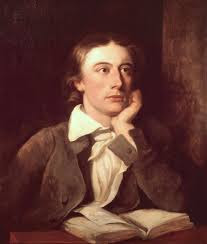My hero:
John Keats
by Helen Dunmore
Helen Dunmore
Saturday 27 March 2010
"Talking of Pleasure, this moment I was writing with one hand, and with the other holding to my Mouth a Nectarine – good God, how fine. It went down soft, pulpy, slushy, oozy – all its delicious embonpoint melted down my throat like a large beatified Strawberry."
Whereas Byron drank soda water to preserve his figure and Shelley wrote a treatise on the natural diet, Keats ate his nectarine, and we taste it 200 years later. Keats was always the man for me. I read his letters in my mid-teens, before I knew much of his poetry. He was warm, earthy, self-mocking, funny and endlessly interested in gossip, weaving a brilliant weft under and over the letters' darker warp of sickness, death and mental anguish.
In the Keats-Shelley house in Rome, you can stand in Keats's bedroom and see the flowers on the ceiling that he saw when he lay dying. All the furniture was burned, as it had to be by law, because he had died of tuberculosis. He'd foreseen the whole ugly business from the first moment that he coughed up arterial blood, because his medical training forbade self-deception as much as his nature forbade self-pity. "I cannot be deceived in that colour; – that drop of blood is my death-warrant; – I must die."
The words reveal an essential toughness. Keats sees things as they are, with all their contradictions. He moves within a few lines from a joke about Winchester's fresh-flannelled doorsteps to the news that he has been writing the "Ode to Autumn". He remarks ironically, in one of his most agonised letters: "The knowledge of contrast, feeling for light and shade, all that information (primitive sense) necessary for a poem, are great enemies to the recovery of the stomach."
When I first read these words I barely understood them, but all the same there was a shock of recognition. At school, poems were all about meaning, and that didn't correspond to what I experienced when I tried to write them. Keats knew that you could write with a nectarine in one hand, and the juice would run into a poem.



No comments:
Post a Comment